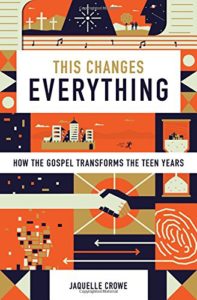Book Review: This Changes Everything by Jaquelle Crowe
Broken and mangled, standing before his torturers, the man was cruelly interrogated.
History records* for us: “He did not even say what his name was, or his race or native city, or whether he was a slave or free. To every question he gave only one answer, in Latin, ‘I am a Christian!’ No other sound did the pagans hear from his lips.”
“What is your name?”
“I am a Christian.”
“What is your country?”
“I am a Christian.”
“Are you slave or free?”
“I am a Christian.”
His name was Sanctus. He was a deacon of the early Church. But to every question asked of him, he had only one reply: I am a Christian. Why? Because to be a Christian was everything: his identity, his country, his past, his future, his Savior, his God, his faith, his King. To be a Christian was to summarize all of who he was. Why? Because the Gospel changes everything.
“Christ, who suffered in him, made him a glorious instrument for conquering the adversary, and a standing proof to others, that there is no grounds for fear, where the love of the Father dwells; nor is there anything that deserves the name of pain, where the glory of Christ is concerned…”*
We, who are in Christ, have this same identity. We have this same Cross, this same resurrection, this same past and present and future. We have the most glorious story of all history, the most significant truth of all the world, the only Gospel of salvation by which we can be saved. And yet often we live as if this life is all we have.
We live as if Christ did not die. We die as if Christ did not rise again. And we waste our lives. As if the Gospel didn’t change us.

This Changes Everything: How the Gospel Transforms the Teen Years, by Jaquelle Crowe, addresses this common problem among many Christians, but especially among Christian youth. If we are saved, then the Gospel has changed every aspect of our lives. This book addresses eight of the most important: our identity, our story, our community, our sin, our disciplines, our growth, our time, and our relationships.
Jaquelle writes: “From one teenager to another, from one Jesus-follower to another, this is what I’ve learned from God’s Word about living a joy-fueled, obedience-filled, and Christ-exalting life while I’m young. My hope is that you’ll find a friend and a helper in me. My prayer is that the gospel will change your life, that you will surrender all to the cause of Christ. My desire is that together you and I will follow Jesus every day— and nothing will ever be the same again.”
Why Should I Read It?
Because we are called to live in light of the Gospel of Christ – to live a life that has been changed to the glory of God. We exist on this earth trying to seek purpose and pleasure from things of passing worth and beauty while denying or living in indifference to the Ultimate Reality of our Ultimate Purpose in light of the Ultimate Worth and Beauty of God, in whom we find Ultimate Joy and Satisfaction.
This life is a means to an end, and often times, we make it everything. But when Christ changes us, He becomes everything, which means that all other things are put into their proper place – allowing us to value them not less, but more! This Changes Everything is a Gospel-centered, Christ-exalting and Joy-filled book written by a Christian young person to other Christian young people. It is very easy to read, immensely practical, and yet deeply profound. It answers the common questions we all face in the most significant aspects of our lives: How does the Gospel change the way I view myself? How does the Gospel change how I relate to others, and who I pursue a relationship with? How does the Gospel change the way I use my time? Social media? Happiness? Family life? My past? My future? Everything.
As Jaquelle says: “God is at work in this generation. He’s raising up young people to reject the status quo and risk everything to obey him. That’s our generation. That’s me. That’s you. And this is our calling. God changes everything. Now, teenager, go out and live like it.”
*Letter from Vienne and Lyons to Phrygia as recorded by Eusebius in 177 AD
